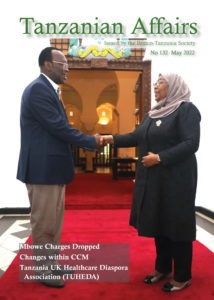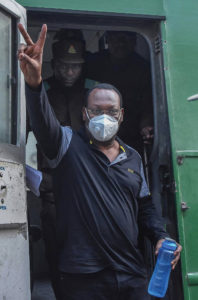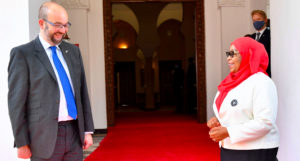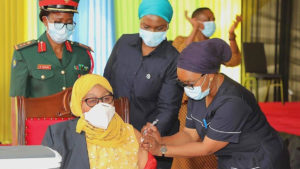by Ben Taylor
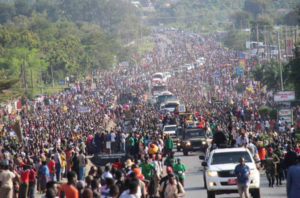
Large crowds view the funeral cortege near Mwanza.
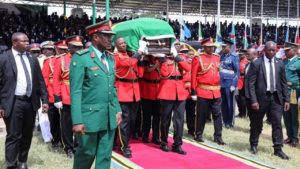
President Magufuli’s coffin is carried into the National Stadium.
President John Pombe Magufuli has died, at the age of 61. He is succeeded by his Vice President, Samia Suluhu Hassan, the country’s first female President, who was sworn in on March 19th, 2021. “This is a time to bury our differences, and be one as a nation,” she said in her inaugural address as leader.
The months of March and April 2021 were a rollercoaster ride for Tanzania. From a few days after the last public appearance of President John Pombe Magufuli on February 27th, to the first State of the Nation address to parliament of President Samia Suluhu Hassan on April 22nd, the nation was beset with a chaotic mix of rumours, tension, drama, mourning and, for some, elation. The full details of what happened during some critical episodes remain uncertain at this time, and may well continue to be disputed by historians and others for many years to come.
The most important facts are known: that President Magufuli passed away, five months into his second term in office, and that his Vice President, Samia Suluhu Hassan, is the new President of Tanzania.
The uncertainty remains in many of the details of how this took place. Rumours began circulating a week into March that President Magufuli had been taken ill. He had not been seen in public for several days, which was unusual but not unprecedented for him. These rumours extended to suggestions that he had contracted the Coronavirus and was suffering severe symptoms. It remains uncertain whether such rumours were based in truth or founded largely on the irony of the idea that a Covid-sceptic President could face such a scenario.
On March 10th, a Kenyan newspaper, The Daily Nation (part of the same media group that owns The Citizen and Mwananchi newspapers in Tanzania, and The East African) put oil on the fire of these rumours. They published an article reporting that an “African leader” was at that time admitted to Nairobi Hospital for Covid-19 treatment, stopping short of naming the leader or the country but hinting very heavily that this was President Magufuli.
Whether the President was indeed admitted to hospital in Nairobi remains uncertain. Senior figures in government, including Prime Minister Kassim Majaliwa, certainly denied this fact. The credibility of their denials is hard to judge, however, given that they also denied that the President was unwell. The Prime Minister asked Tanzanians to be calm because “President John Magufuli is safe and he is going about his work,” and accused “hateful Tanzanians living abroad” of spreading rumours. “If he were sick,” he asked, “would I have spoken to him on the telephone? He sent his greetings to you.”
Beyond reporting such reassurances, Tanzanian media stayed almost entirely silent on the health and whereabouts of President Magufuli at this time. In contrast, international media outlets – the BBC, Al Jazeera, Reuters, and many more – covered the matter eagerly, quoting unnamed sources and reporting every utterance of opposition leader, Tundu Lissu, as he made a series of bold and largely evidence-free assertions about the situation. The President had already died, according to some rumours, or had been transferred to a hospital in India, or South Africa. The President’s closest allies were alleged to be taking advantage of the power vacuum to loot the national gold reserves and/or the Bank of Tanzania.
The audience for international media houses within Tanzania may be small, but rumours spread rapidly, particularly on WhatsApp and similar services.
On March 15th, Vice President Samia Suluhu Hassan urged Tanzanians not to be unnerved by “rumours flying around”, saying “the country was safe”. “It’s quite normal for a person’s body to be indisposed and contract the flu or develop a fever… this is the time for Tanzanians to be united through prayer,” she said, without stating who she was talking about. “As Tanzanians, we must work together, be united and build our nation. Most of the rumours you hear don’t originate in Tanzania, they come from outside the country. I ask you to ignore them. If it’s about prayers, pray, but all in all, we should remain united and take Tanzania forward. We’re safe,” she said.
On the same day, The Citizen newspaper reported that police across the country had continued “crackdowns on those spreading false information, especially on social media platforms.” They noted reports that police in Kilimanjaro region were holding two people on suspicion of spreading false information on social media concerning senior government officials’ health. “This brings the number of suspects arrested in connection with spreading online fabricated information related to the health of President John Magufuli to four,” the paper stated.
Two days later, on March 17th, the Vice President made a short statement live on the state-run TBC TV station. Visibly distressed, she announced that President Magufuli had died at 6pm that evening at Mzena hospital in Dar es Salaam. He had been admitted, she stated, on March 6th to the Jakaya Kikwete Heart Institute after suffering complications related to his long-standing heart condition, chronic atrial fibrillation, but had been released the following day. A week later, on March 14th, he had felt unwell and was admitted to Mzena hospital, where he remained until his death three days later.
Reactions: grief, tributes, and a few celebrations
Vice President Hassan announced fourteen days of national mourning. Huge crowds of mourners lined the streets and flocked to see his body lying in state in the cities of Dar es Salaam, Dodoma, Zanzibar, Mwanza and Geita, weeping and throwing petals as it passed in a motorcade.
In one tragic case, 45 mourners were killed and 37 injured due to stampedes and lack of air amid overcrowding at a public viewing of the body at Uhuru stadium in Dar es Salaam, on March 21st. This was confirmed by Lazaro Mambosasa, Dar es Salaam’s zonal police commander. The stampede was triggered when a wall collapsed after some people climbed it to get a better view, according to Mr Mambosasa.
President Magufuli was buried in the evening of March 26th at his home in Chato, in northwest Tanzania. His body arrived at Rubambagwe Stadium, Chato, mid-morning, and he was honoured with the singing of the national anthem and East African anthem, and a 21-gun salute. A Catholic mass was conducted by the Archbishop Gervas John Nyaisonga, and his body was transferred to his home for burial. President Samia Suluhu Hassan, ex-presidents Ali Hassan Mwinyi and Jakaya Kikwete, other dignitaries and religious leaders from different faiths were in attendance.
It is hard to assess the true level of President Magufuli’s popularity with Tanzanians, as the usual measures were all compromised. The general election in 2020, in which he won 84% of the vote, was marred by irregularities, and opinion polling had been suspended – effectively banned – since a poll published in 2018 suggested his popularity had fallen sharply from previous record highs. And yet there is no doubt that among many, probably most Tanzanians, President Magufuli was a hero: for speaking for ordinary citizens, for standing up to foreign business interests and governments, for rooting out corruption and waste, and for investing in the country’s future.
“I have never cried because of any leader’s death, but President Magufuli has made me cry because I remember his good performance,” said Lucky Mwandeko, a resident of Dar es Salaam. “He brought discipline to the country. We have lost a very great leader.”
Equally, there are some who saw President Magufuli as a villain: that his stance on the Coronavirus pandemic had cost lives, that he showed little respect for the rule of law or freedom of expression, that his hardball tactics with investors undermined the country’s economy, that his misogyny turned back the clock on the cause of gender equality, that he subjected his political opponents to imprisonment and violence, that he systematically weakened democracy and democratic institutions.
Among Tanzanians, the foremost such voice belongs to the opposition leader Tundu Lissu. Speaking from exile in Belgium, he described President Magufuli’s death as “poetic justice,” alleging that he succumbed to COVID-19 after defying the world and science on the virus. “Magufuli caused havoc to our country,” he said. “There are so many people who have been killed in these five years, … injured, tortured, persecuted. I barely escaped with my life. He is dead and this is an opportunity, a rare opportunity, for our country to come together for national reconciliation,” he said.
International media obsessed over the thought that a Covid-denier might have succumbed to Covid. “Bulldozed by reality,” was the headline in The Economist.
A more nuanced view came from political columnist Elsie Eyakuze, no fan of the late President. “Dear John, I forgive you,” she wrote. “Death has robbed us of the leader you might have become if our prayers had been answered.”
“I can admit that I thought news of your demise would delight me. … It turns out I was wrong. My relief that your misogyny and cruelty will no longer weigh upon my mind is real and will remain with me forever. But I did not expect to feel sad. I did not expect to feel a bit bereft, slightly melancholy. I certainly did not expect to be moved when I watched your casket being opened for public viewing as your friends and family, who clearly cared for you, shed tears. I did not expect to attend mass via television not once, but twice, and genuinely pray that your Lord would have mercy on your soul.”
“Cause of death? Frankly, my dear, I don’t give a damn. I do care that you did not die alone. John, I truly hope that someone held your hand with comfort and tenderness to the very end, that you were not afraid, that you were not in pain. Foolish, weak-hearted, stupid woman that I am, I hope you passed on peacefully.”
